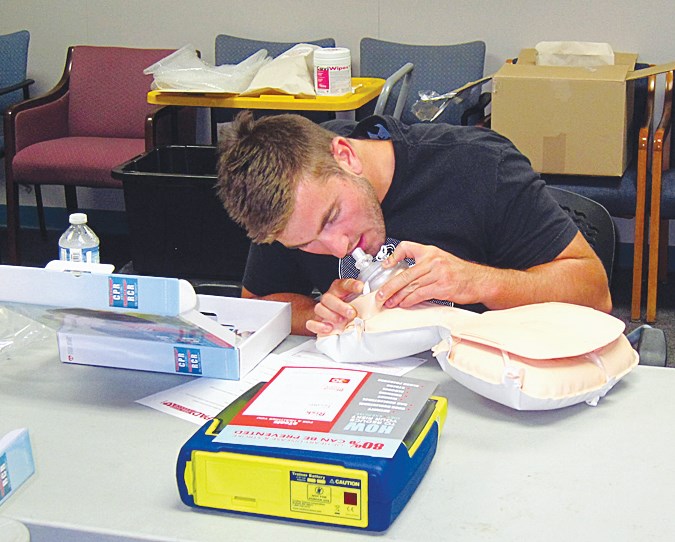Around $40,000 worth of life-saving defibrillators have been donated to strategic parts of Richmond in a bid to increase public safety.
King George Park was one such place last week when an automated external defibrillator (AED) was handed over by the Heart & Stroke Foundation to staff at the park as part of a joint venture with the government, called the BC Public Access to Defibrillation (PAD) Program.
The initiative was one of several in Richmond in recent weeks — others were installed at: Terra Nova Rural Park; West Richmond Pitch and Putt; Stevenson-London Park; Garden City Park; Hugh Boyd Park; Minoru Park and soon at Garry Point Park.
A total of 450 AEDs will eventually be installed at public venues across the province, such as community centres, arenas, recreation centres, playing fields and parks over the next two years.
King George Park staff participated last week in an overview about the device, led by Richmond paramedic Kathy Pascuzzo, where they learned the chain of survival — call 911; do CPR and use an AED.
“As a paramedic, I see first-hand the tragic effects of cardiac arrest on the patient as well as the bystanders, which are often friends and family,” said Pascuzzo. “I am proud to provide CPR/AED orientation for my community and increase the number of people who can provide valuable, life-saving assistance during a medical emergency.”
As a first aid cadet with St. John Ambulance in her youth, Richmond MLA Linda Reid understands first-hand how public access to AEDs will have a profound and positive impact in the community.
“I encourage everyone to learn CPR; it is an important lifesaving skill,” said Reid.
The British Columbia Ambulance Service (BCAS) has also linked the AED Registry with the ambulance dispatch system.
This registry will enable a bystander who calls 9-1-1 to be directed by a BCAS dispatcher to the nearest AED. BCAS dispatchers can also assist bystanders to apply an AED during a medical emergency.
“We’re placing AEDs where there is the greatest chance they’ll save a life,” said Deborah Rusch, PAD program manager with the Heart & Stroke Foundation.
“Through this program, we will donate hundreds of AEDs to public places across the province, such as King George Park, and give bystanders the tools to help someone suffering a sudden cardiac arrest.”
Sudden cardiac arrest strikes suddenly and affects people of all ages. BCAS attends between 2,400-2,800 cardiac arrest calls each year. Fewer than 12 per cent of people who have a cardiac arrest survive. Without immediate help, someone in sudden cardiac arrest will suffer brain damage within three minutes, and after 12 minutes, it’s unlikely they’ll survive.
Evidence shows the CPR coupled with defibrillation, or an electrical shock to the heart, increases the survival rate for sudden cardiac arrests, which occur in public settings.
An AED is a safe, portable device anyone can use to deliver an electric shock to restart a heart in sudden cardiac arrest. The AED reads the heart rhythm and only delivers a shock if needed.



